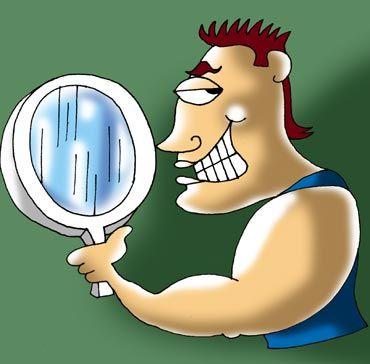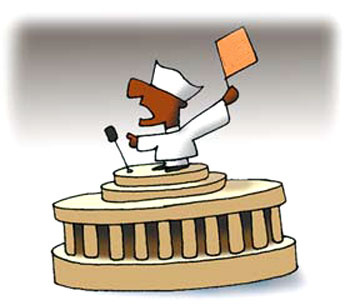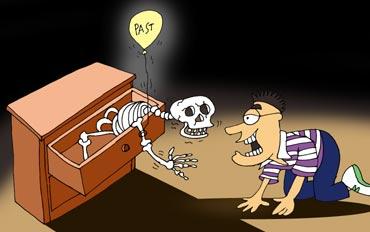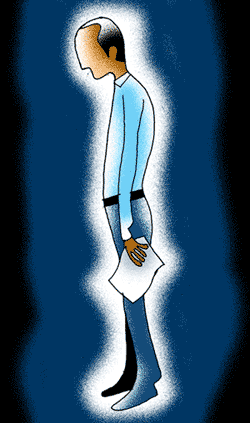
The way you introduce yourself always goes a long way in deciding the course of any meeting. Language and communications expert Preeti Shirodkar tells you the dos and don'ts of making a great first impression.
There are various formal and semi formal situations in your professional life, where you will need to introduce either yourself or another person.
After your appearance, how you introduce yourself forms an important preliminary impression that the other person forms of you.
It is thus important to be creative, understated and yet effective, in the way in which you introduce yourself, so as to create a suitable and lasting effect on others.
While introducing yourself, it is important, more especially if the other person is of the opposite gender, to allow the woman to decide the accompanying non-verbal gesture, in order to avoid embarrassment.
Imagine the embarrassment when you extend your hand and the woman simply does a 'namaste' or says 'good morning' without so much bothering to accept the handshake!
So here are few things you must keep in mind while introducing yourself.

While introducing yourself in a formal situation, you should preferably only state your name and designation.
Moreover, if the audience is only/largely international, it is important to spell out your name.
A detailed introduction can include details about your job profile, your career graph/educational background or significant professional achievements.

In an informal situation, you should state your name, profession and areas of interest, especially those, which would be relevant to the given situation.
The areas of interest could include your hobbies, likes and dislikes and preferences or qualities.
However, nothing that would sound excessively personal/embarrassing should be said.

At an interview, it is very important to introduce yourself effectively, as it could provide a direction to the interview.
Apart from stating one's name, final qualification/multiple qualifications (or the penultimate and final qualification, if they are disparate), work experience, major achievements and languages known (if it would provide an edge in the given situation), it is important to define your strengths and hobbies.
The thing to remember here is that the tone should not be boastful.
So too, it is important not to go on in a monotonous/typical way, as most of what you would say would be what is stated in your resume.

'Myself so-and-so'
Commonly used as the first line in an introduction, saying 'myself so-and-so' creates an awful impression quite simply because it is grammatically incorrect. One needs to rather think of a creative yet indicative manner of introducing oneself.

Your introduction should be brief, so that the listener does not lose interest/focus.
The details of your achievements can be provided only when a person asks for them. An effective introduction of the self should take between one and two minutes to make.

This would make the introduction not merely sound monotonous, but would also make you come across as being self-focussed.

Bragging about your achievements, however significant, may give the impression of you being vain / too full of yourself.
In fact, this may even serve to alienate the audience, as one's performance/reputation would in the long run have a greater impact than what one has said.

What one's family has/hasn't achieved cannot in any way reflect one's potential/actual achievements.
For instance, the child of a CEO may not necessarily rise to that position. Similarly, that of a carpenter, for one, may make it really big.
Moreover, the number of siblings one has etc. is not really consequential during self-introduction. However, in case the information is in some way directly relevant, you could mention it.
Similarly, there is no need specify where you live unless you are asked about it. Recently during a round of campus recruitment a bright young student was turned away when she happened to mention that she lived in a distant Mumbai suburb. No amount of explaining her sincerity and punctuality helped her get the position.

You should essentially make your way around on the basis of your potential, rather than riding piggyback on the reputation of your contacts/people in your network.
Although at times this may open doors, it can also build your image as a stooge, incapable of making it on your own.
Moreover, namedropping a casual acquaintance you don't necessarily know or remember you will most certainly cause a great deal of embarrassment.
Drop names but only when you're sure it will encourage bonding and not as a means to impress.
In an interview, references too should thus be provided on request.

The growth of an individual needs to be constant. Else it reflects stagnation or becomes indicative of the fact that one has been resting on one's laurels.
Therefore although you may mention highly significant achievements from your remote past, it is important to focus on the immediate rather than distant past.
Moreover, if the number of achievements is significant, you can club them under general heads and leave the listener to dwell on those that interest him/her.

Unless it is for a valid reason, a break in academics or career reflects negatively on your r sum .
And though there is no reason to draw unnecessary attention to it, hiding them can, in its own way, prove unproductive.
Let us consider a hypothetical situation: You have been an assistant manager for two years and have had to take a break for another two. Not mentioning the break will give your employer the impression that you have been in the same position for the last four years!
So too, if a career/academic break is discovered after joining an organisation can create a negative impact.

It is extremely common to mention reading, listening to music and travelling as hobbies, as they sound neutral yet good.
However, if you aren't really interested in them and the interviewer decides to quiz you about it, things can get very embarrassing indeed.

Though it is ridiculous to say that one has no weakness, if the question were to be posed during an interview, it is equally foolish to volunteer unwarranted information. Thus unless specifically asked about one's weakness in an interview, it is an area that is best left untouched.
The purpose of an introduction is to rouse the interest, curiosity and desire in the other to get to know you better. A brief but effective introduction would do just that, while a sketchy or boastful one would have the opposite effect, defeating its very meaning.